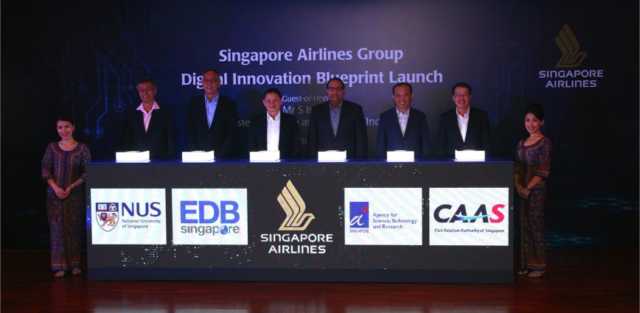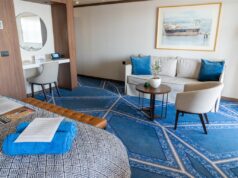- Bilateral partnerships with A*STAR, CAAS, EDB and NUS to establish SIA as a digital aviation and travel experience leader
- Digital Innovation Blueprint to contribute towards development and nurturing of digital aviation and travel technology community in Singapore
Singapore Airlines (SIA) announced on January 29th, 2018, the launch of its Digital Innovation Blueprint through the unveiling of key bilateral partnerships with the Agency for Science, Technology and Research (A*STAR), Civil Aviation Authority of Singapore (CAAS), Economic Development Board (EDB) and National University of Singapore (NUS).
The Digital Innovation Blueprint is part of SIA’s ongoing transformation programme under which it is significantly boosting its digital capabilities. The Airline has been progressively building an open innovation culture across the Group through staff involvement in digital projects, and supporting employees through digital training, such as in digital innovation and design and agile methodologies. A Digital Innovation Lab is being set up to enable staff to work with innovative companies including start-ups, established incubators and accelerators, to stimulate new ideas and facilitate collaboration in a creative environment. The Airline is now taking its Blueprint to the next level through extensive collaboration partnerships.
Representatives from A*STAR, CAAS, EDB, NUS and SIA commemorated the launch of the partnerships at an unveiling ceremony today at the Singapore Airlines Training Centre, graced by Minister for Trade and Industry (Industry), Mr S Iswaran. While each partnership brings something different to the table, spanning across areas such as research, innovation and entrepreneurship, a key focus will be on building capabilities to increase effectiveness and efficiency through digital technology and open innovation as well as to develop new business opportunities.
“The SIA Group has been investing heavily to enhance our digital capabilities as part of our ongoing transformation efforts, and the new bilateral partnerships announced today will take things to the next level. Our partnerships with these key agencies also signify our commitment to developing Singapore as a digital hub in the wider aviation and travel industry,” said SIA CEO Mr Goh Choon Phong.
“With the launch of our Digital Innovation Blueprint, we aim to be the leading digital airline in the world.”
The partnerships with CAAS and EDB mainly establish joint support to foster a vibrant digital aviation and aerospace ecosystem, increasing the attractiveness of Singapore as a travel and aviation hub in the Asia-Pacific region. This will involve the digitalisation of the aviation and aerospace ecosystem to transform and enhance the industry’s capabilities, efficiencies and resiliency. At the core of this is to also drive traveller-centric convenience with digitally-enabled experiences and engagements.
“SIA is a key partner in the transformation and growth of Singapore’s aerospace and aviation sectors. EDB is happy to support SIA on its digital innovation journey to strengthen its digital capabilities. This will not only help SIA to optimise its operations but potentially catalyse new growth opportunities for SIA,” said Mr Lim Kok Kiang, Assistant Managing Director of Singapore Economic Development Board.
Kevin Shum, Director-General of the Civil Aviation Authority of Singapore, said: “CAAS is pleased to support SIA’s Digital Innovation Blueprint, in collaboration with A*STAR, EDB, NUS, and NUS Enterprise, to develop innovative digital solutions to personalise passengers’ end-to-end travel experience and transform ground handling processes. The Blueprint will help to transform the aviation industry for the future. It will complement the other key initiatives under the Air Transport Industry Transformation Map (ITM). We look forward to an exciting and fulfilling journey ahead.”
A Master Research Collaboration Agreement (MRCA) has also been signed with A*STAR to identify and develop applied research partnership opportunities, which include research fields in areas such as data analytics, Internet of Things and virtual and augmented reality to boost efficiency of maintenance processes. The goal is to develop smart solutions that help lower maintenance costs, decrease aircraft delays, and aid the Airline in enhancing service standards.
Professor Tan Sze Wee, Executive Director, Science and Engineering Research Council, A*STAR, said: “This MRCA will identify and drive the deployment of technologies in fields such as video and data analytics, virtual and augmented reality, and automated technologies to boost the efficiency of aviation operations. This partnership forms part of SIA’s Digital Innovation Blueprint to boost the airline’s capabilities in digital aviation, and accelerate the adoption of digital technologies in the aviation and travel industry.”
Two Memoranda of Understanding (MOU) were signed between SIA and NUS. Under the first MOU, Singapore Airlines and three NUS faculties – namely Business, Computing and Engineering – will establish and pursue joint research projects, with a focus on longer term research related to business challenges that do not have immediate solutions available today. The partnership will enable both parties to exchange scientific, academic and technical information, as well as participate in joint research and development activities, seminars, conferences and workshops in the areas of digital aviation and travel experience.
Under the second MOU, SIA will collaborate with NUS Enterprise, the entrepreneurial arm of NUS, to jointly develop an innovation ecosystem around the themes of Digital Aviation and Travel Experience, to create and grow new technologies, start-ups and talents that can solve SIA’s businesses challenges via a joint accelerator programme.
NUS President Professor Tan Eng Chye said: “NUS is pleased to be a knowledge partner of SIA’s Digital Innovation Blueprint. Leveraging our strong and deep capabilities in data science, analytics, optimisation, cybersecurity and automation, as well as our comprehensive innovation and enterprise networks in Singapore and the region, we hope to open new opportunities for our researchers, students and start-ups to create and commercialise disruptive technologies that could accelerate the digital transformation of Singapore’s aviation sector and redefine the air travel experience.”












